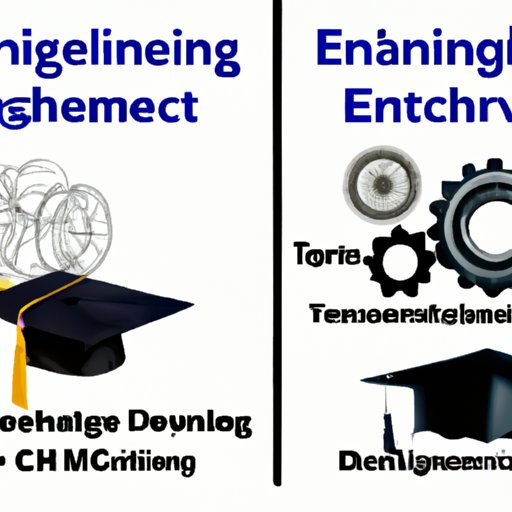Overview of an Engineering Technology Degree
An engineering technology degree is an undergraduate degree that focuses on the practical application of engineering principles in the workplace. Students learn how to design, analyze, build, and maintain engineering systems. Unlike traditional engineering programs, engineering technology programs focus more on the hands-on applications of engineering principles rather than the theoretical aspects of engineering.
Definition of Engineering Technology Degree
The National Science Foundation (NSF) defines engineering technology as “the application of scientific and mathematical principles to the design, development, maintenance and operation of machines, materials, processes, and systems for the benefit of humankind.” This definition highlights the emphasis placed on the practical applications of engineering principles in engineering technology degrees. Students will learn how to use their knowledge and skills to solve real-world problems.

Difference between an Engineering Technology Degree and an Engineering Degree
The primary difference between an engineering technology degree and an engineering degree is the focus of each program. Traditional engineering degrees are focused on the theoretical aspects of engineering, while engineering technology degrees focus more on the practical aspects. Engineering technology students learn the fundamentals of engineering such as mathematics and physics, but they also learn how to apply these principles in the workplace.
For example, engineering technology students may take courses on computer-aided design (CAD) and manufacturing processes. Engineering students, on the other hand, may take courses on thermodynamics or fluid mechanics. Engineering technology students may also be required to complete internships and lab work, which are not typically required for engineering students.

Benefits of an Engineering Technology Degree
An engineering technology degree provides students with the skills and knowledge necessary to enter the engineering field. Students learn how to use the latest technologies in the engineering industry, such as CAD software, robotics, and electronics. They also develop problem-solving and critical thinking skills, which are essential for success in the engineering field.
In addition, engineering technology students gain experience working in teams and collaborating with other professionals. This experience can help them succeed in the workplace, as engineers often need to work together to solve complex problems.
Types of Courses Offered in an Engineering Technology Degree Program
Engineering technology degree programs typically include core courses, elective courses, and laboratory work. Core courses cover topics such as mathematics, physics, chemistry, engineering design, and computer-aided drafting. Elective courses allow students to explore specific areas of interest such as robotics, control systems, or power systems.
Lab work is also an important part of an engineering technology degree program. Labs provide students with the opportunity to apply their knowledge and skills in a hands-on environment. This allows students to gain practical experience and develop their technical skills.

Career Opportunities with an Engineering Technology Degree
An engineering technology degree provides graduates with a wide range of career opportunities. According to the U.S. Bureau of Labor Statistics, employment of engineering technicians is projected to grow 5 percent from 2018 to 2028, about as fast as the average for all occupations. Areas of specialization for engineering technology degree holders include mechanical engineering, electrical engineering, and civil engineering.
The Role of Technology in the Field of Engineering
Technology plays an important role in the field of engineering. Advances in technology have allowed engineers to develop new products and systems more quickly and efficiently. Technology has also enabled engineers to solve complex problems that were previously impossible to solve.
Examples of technology used in engineering include computer-aided design (CAD) software, 3D printing, virtual reality (VR) simulations, and artificial intelligence (AI). These tools allow engineers to create detailed designs and prototypes faster than ever before. They also enable engineers to test and refine designs without having to build physical models.
Steps to Achieve an Engineering Technology Degree
To earn an engineering technology degree, students must meet certain prerequisites, admission requirements, and degree completion requirements. Prerequisites vary depending on the school and program, but typically include mathematics, physics, and computer science courses. Admission requirements may include transcripts, letters of recommendation, and standardized test scores.
Once admitted, students must complete the required courses and laboratory work for the degree. Most engineering technology degrees require students to complete 120 credits, including general education courses and major courses. Students may also need to complete an internship or research project prior to graduating.

Common Challenges Faced by Engineering Technology Degree Holders
Earning an engineering technology degree does not guarantee a job in the field. Many engineering technology degree holders struggle to find employment due to the competitive nature of the industry. It is important for engineering technology degree holders to continuously update their skills and stay abreast of the latest advances in technology.
Another challenge faced by engineering technology degree holders is learning to adapt to new technologies. As technology continues to evolve, it is important for engineers to keep up with the changes in order to remain competitive. Finally, engineering technology degree holders must be prepared to face rapidly changing technology, as new technologies emerge every day.
An engineering technology degree is a great way to enter the engineering field. With the right education, knowledge, and skills, engineering technology degree holders can pursue a successful career in the field.
(Note: Is this article not meeting your expectations? Do you have knowledge or insights to share? Unlock new opportunities and expand your reach by joining our authors team. Click Registration to join us and share your expertise with our readers.)
